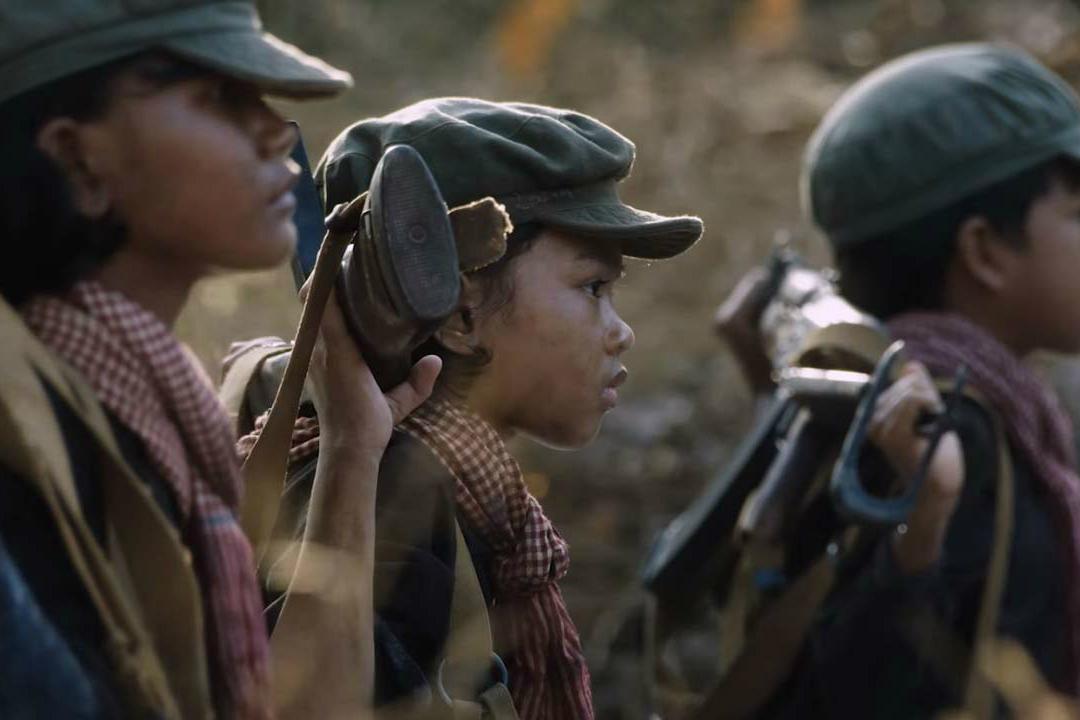First They Killed My Father, Toronto Film Festival review: Angelina Jolie's best work yet
Only very late on does Jolie indulge in the kind of melodramatic flourishes you’d expect in a Hollywood movie on the same subject

Angelina Jolie, 136 mins, starring: Sreymoch Sareum, Phoeung Kompheak, Sveng Socheata
First They Killed My Father (which screened at the Toronto Festival this week) is Angelina Jolie’s fourth feature as a director. It is by some distance the best film she has yet made. Based on Loung Ung’s memoir, this is the story of the extreme suffering of a middle-class Cambodian family during the Khmer Rouge years in the mid 1970s.
It boasts an astonishing performance from newcomer Sreymoch Sareum, who plays Loung from the ages of five until nine, and from whose point of view we witness the horror as the country is re-made in Year Zero.
Jolie has struck her Faustian bargain with Netflix which means that a film which would surely benefit from being seen on the big screen will get minimal play in cinemas. The upside is that it is instantly available to watch at home.
It’s easy to scoff at the Hollywood star as a do-gooding celebrity who helicopters herself into other cultures and tells stories which would be far better tackled by locals who understand what is at stake. In this case, she has chosen her collaborators very carefully.
The film is executive produced and co-scripted by its subject Loung Ung and it is produced by Rithy Panh, the Cambodian author and filmmaker who himself survived the madness of the Pol Pot era. The actors are all Cambodians.
We hear hardly any English in the film apart from a few words from President Richard Nixon, looking as shifty as always in archive footage as he claims that the US administration is trying to help the Cambodians to “help themselves” by abandoning them to Pol Pot.
One of our first glimpses of Loung is of her face reflected in the family’s TV screen. Loung’s father is a captain in soon to be deposed President Lon Nol’s army. Her mother is a beautiful socialite. Her parents enjoy alcohol, music and food. As the film begins, Khmer Rouge forces are about to arrive in Phnom Penh. Locals blithely wave them in with their handkerchiefs, little realising what is about to unfold.
In Democratic “Kampuchea,” as the country is re-christened, there is no banking, no trading, no private property - and no colour or enjoyment either. Loung’s family is marched out of the city. They’re told they can return in three days but they very quickly realise that they are unlikely ever to see home again. Her parents have to pretend that they are poor peasants. They are made to work the fields.
What follows is a chronicle of despair. There are beatings and killings. Food is very short. If anyone shows any signs of being bourgeois, if they speak French or seem too educated, they will be punished severely. They are indoctrinated to love the communist leadership, the Angkar, more than their own relatives. Loung’s parents do their best to shield the children from the death and suffering around them but it is so all pervasive that the kids can’t escape it.

Watch Apple TV+ free for 7 day
New subscribers only. £8.99/mo. after free trial. Plan auto-renews until cancelled.
ADVERTISEMENT. If you sign up to this service we will earn commission. This revenue helps to fund journalism across The Independent.

Watch Apple TV+ free for 7 day
New subscribers only. £8.99/mo. after free trial. Plan auto-renews until cancelled.
ADVERTISEMENT. If you sign up to this service we will earn commission. This revenue helps to fund journalism across The Independent.
Cinematographer Anthony Dod Mantle includes several shots of the camp from high above. Just as in Rithy Panh’s film The Missing Picture, in which Panh recreated Pol Pot’s Cambodia using clay figures and animation, the characters look as if they’re toys or cogs in some gigantic machine.
At ground level, the picture is very different. Again and again, we will see some horrific incident and then we will be shown Loung’s face as she looks on, trying to make sense of the cruel and bizarre happenings. Like Jim in JG Ballard’s Empire Of The Sun, she is tough and resilient - a little warrior. She adjusts far better to her new world than the adults around her.
There are some very emotional moments here in which children and parents are separated. These are made all the more excruciating because none of the characters are allowed to express their feelings openly. (To do is considered the height of bourgeois decadence.)
The closest we get to humour is when Loung and her siblings are enrolled in the people’s army and given a crash course in how to fight and kill the detested Vietnamese. Their instructors are almost comical in their fervour.
One of the strengths of First They Killed My Father is its matter of fact quality. Only very late on does Jolie indulge in the kind of melodramatic flourishes you’d expect in a Hollywood movie on the same subject. Instead, she shows us the madness of the Pol Pot years from the vantage point of the resourceful child, trying to rationalise the apocalyptic world in which she finds herself.
First They Killed My Father will debut on Netflix 15 September.
Join our commenting forum
Join thought-provoking conversations, follow other Independent readers and see their replies
Comments